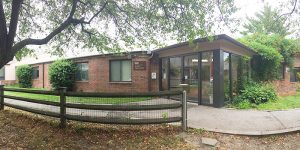By Katelyn Malvese, Lola Nedic, & Sarah Scharlin Ben-Hamoo
“Resilience in Development”, CSHD 67, taught by Professor Ann Easterbrooks highlights the capacity of individuals and families to thrive in the context of adversity. Professor Easterbrooks emphasizes the importance of support networks and community resources as building blocks in fostering resilience among children, youth, and families. As part of the course, students do 20 hours of service learning in community organizations. An important feature of this requirement is to connect the volunteer experiences to the framework and principles of the course.
Food Insecurity:
Four students in the class volunteered to tackle food insecurity in the Boston area. They worked with the “Just Eats” program, which is a part of Food for Free, an organization that provides food for local communities, or with “Building Audacity”. Food for Free, for example, partners with local grocery stores to acquire fresh, unsold food, eliminating food waste and providing food to families. Volunteers package 2000-3000 boxes of food each week. Students working with Food for Free and Building Audacity noted that food security is incredibly important in fostering resilience. They all noted that their work with organizations that limit food waste and provide food to those in need was extremely fulfilling personally.
Research and Outreach:
Other students worked behind the scenes of programs that foster resilience. Some worked with UU Urban Ministry (UUUM), based in Roxbury and grounded in a social justice framework. Their programs include Roxbury Youth Programs, an after-school program for youth; Renewal House, a home and shelter for families who are survivors of domestic violence; United Souls, a program supporting men facing re-entry and other issues within urban life; and Stand High/Stand United, a program for elementary school-aged children. Together, the Tufts students produced a logic model and survey to gauge where the programs are thriving and where they can improve, and they presented their work to the organization’s board. In one semester, these students worked to create a lasting impact on UUUM’s programs, and the hundreds of people who benefit from them.
Several students worked with organizations promoting health and wellness. One volunteered with Peer Health Exchange (PHE), a national organization that educates high schoolers about mental and sexual health, and substance abuse; topics that are often neglected in high school curriculums. Despite the many challenges that arise when trying to connect with youth via a virtual format during a pandemic, the program connects with students to discuss the importance of mental health as a protective factor to students in promoting resilience. Other students worked with the HOPE (Healthy Outcomes from Positive Experiences) Project, a program at Tufts University School of Medicine that highlights the power of positive childhood experiences in fostering resilience. These students worked on a CDC-sponsored study of the effects of Covid-19 on American households, trying to understand what helped foster resilience during the pandemic.
Another student worked with MassVote to foster resilience in the Black community. The organization focuses on voter suppression. For example, a current project is offering to help people register to vote at COVID vaccination sites. This has created trust between the community, the medical community, and in the voting process.
Finally, another pair of students worked with a boy studying for his Bar Mitzvah who, because of severe learning disabilities, struggled to learn in a typical Hebrew school setting. The synagogue, with the help of these two students, has provided him a safe space to learn and grow, and build confidence despite many family adversities. This is a reciprocal experience of resilience development, since their tutoring has helped him build learning skills and confidence in his abilities, and his hard work and growth has provided personal growth for these two students.
Conclusions
Students were given the opportunity to learn about resilience in local communities, which has given them additional insight into the course curriculum. While some service focused on fostering resilience in individuals, others looked more broadly at the entire community. On every scale, focusing on a resilience model as opposed to a deficit model is beneficial. These programs were able to help communities both directly and indirectly, by giving them essential resources, building confidence, or empowering people to fight against racist systems. This experience has given the students the opportunity to grow as individuals, and to foster resilience within themselves and our communities, regardless of limitations put on by a global pandemic.


 ABOUT
ABOUT